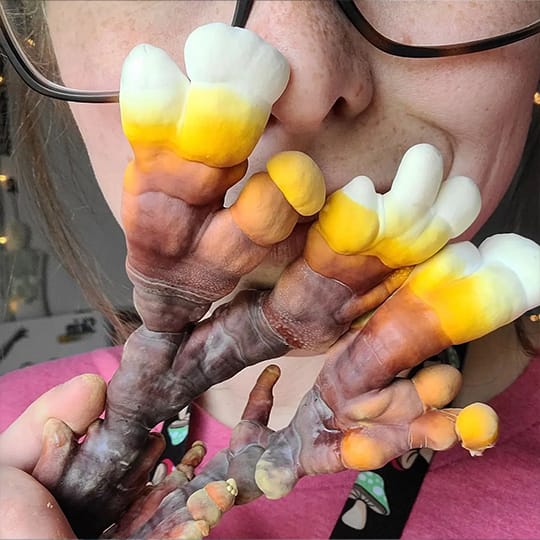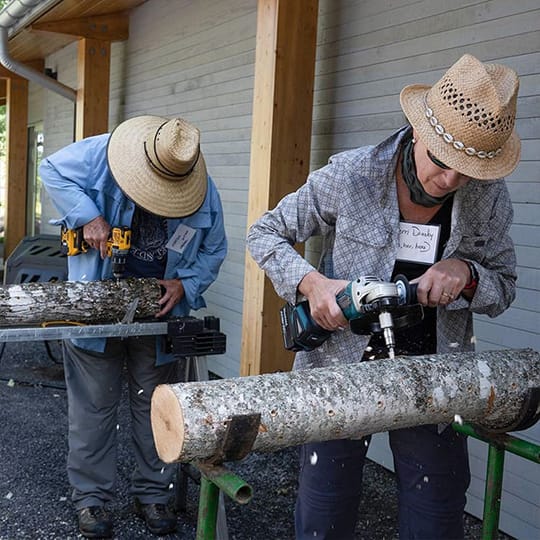Organic Chestnut Mushroom Grow Kit Fruiting Block










| Skill level | Intermediate |
| Grow location | Indoors |
| Grow speed | 2 to 3 weeks |
| Shelf life | 6 months (refrigerated) |
| Kit dimensions | 6in H x 9in W x 6in D |
| Kit weight | 5 lbs |
| Fruiting temps | 60-70°F |
Our chestnut (Pholiota adiposa) fruiting block features a popular strain widely cultivated in Japan. Mushrooms are velvety with small-to-medium, delightfully speckled caps resembling the color of their namesake nut. And when cooked, they have a woodsy aroma, a crunchy texture, and a rich, nutty, mildly-sweet flavor.
Chestnuts prefer cooler temperatures and are prone to drying out or stopping their growth if humidity is not maintained when the mushrooms are still in their early stages. They can also be trickier to get subsequent fruitings, so attempting a second flush requires extra work and attention.
“5 of the Best Chestnut Mushroom Recipes”
Upon receiving your kit:
Remove kit from the shipping box as soon as possible. Then, unfold the top of the bag, making room for air space. It's also important to check and confirm that the filter patch is not obstructed. This will help the organism breathe and continue to thrive until you are ready to grow your fruiting block!
Scroll down for guides on growing, storage, cooking, and more.
-
For the majority of mushroom species, all that is needed to initiate fruiting (or begin the growth cycle) is a change in environmental conditions -- specifically humidity, light, temperature, and changes to oxygen and CO2 levels.
For best results:
We recommend growing your chestnut block in a fruiting chamber (like a monotub or martha tent) as a controlled environment will decrease the risk of contamination and increase the chances of success.
Creating optimal conditions:
The environmental parameters for chestnut mushrooms can be found on this page under "Temp, Humidity & CO2 guide" and on page 12 of our fruiting block instruction booklet.
Preparing your block:
- Wait until the block begins to turn orange within its bag before initiating fruiting.
- When ready to fruit, tightly fold excess plastic back and place block face up.
How to initiate fruiting:
- Place the bagged chestnut block in the refrigerator for approximately eight hours.
- Remove from refrigerator and slice bag with a single diagonal line or with an X.
- Chestnut mushrooms can be top or side fruited.
- Place in fruiting chamber until ready to harvest.
Special considerations:
- Chestnut mushrooms are slow to pin.
- Color will transfer to lighter colored mushrooms when grown or packaged together.
Harvesting your mushrooms:
Harvest chestnut mushrooms before the veil breaks in order to prolong shelf life; caps will still be cupped. Chestnuts have a short shelf life if harvested when the caps have flattened out.
Growing different blocks together:
With some compromise, many different species of mushrooms can be grown together in a fruiting chamber. First, consider the temperature range of the mushrooms you desire to grow, and second, the CO2 sensitivity. Humidity ranges overlap for the majority of species. We encourage you to experiment with many different groupings!
Troubleshooting:
Having issues with unusual growth, stunted growth, or no growth at all? Refer to pages 16-18 in our fruiting block instruction booklet.
-
Temperature 60-70°F | 15-21°C Humidity (Phase 1: Primordia) 98-100% Humidity (Phase 2: Fruitbody) 88-95% CO2 Sensitivity (Phase 1: Primordia) 500-1,000 ppm CO2 Sensitivity (Phase 2: Fruitbody) <1,000 ppm - Primordia - The earliest recognizable stage of fruitbody development. Also known as “baby mushrooms” or “mushroom pins.”
- Fruitbody - A fully grown mushroom, the reproductive structure of the organism in which the spores are produced.
- CO2 sensitivity - When CO2 levels are too high, yields will decrease, stems will become long and stringy, caps will be small, and/or growth will halt.
-
If you don't plan to use immediately, you can refrigerate your block for up to 6 months.
-
"5 of the Best Chestnut Mushroom Recipes"
For those who enjoy the distinct nutty flavor of chestnut mushrooms, we recommend frying them up with butter and garlic or adding them to your favorite creamy soup or pasta dish. As with other mushrooms, chestnut mushrooms require thorough cooking. However, given their lower moisture content, they do not require “sweating” in the pan.
-
If you’re going to consume home-grown mushrooms, make sure to cook your fresh mushrooms thoroughly with heat. If it is your first time eating this species, it is best to start with a small amount to check for allergies, even if cooked.
Mushrooms grow spores as they develop. This is a natural means of reproduction. This is when people with allergies or compromised immune systems may want to consider putting fruiting mushroom kits outdoors or in a well-ventilated area. Spores in mushrooms sometimes cause respiratory irritation. In rare cases, spores may also cause irritation for some non-allergic or non-immunocompromised mushroom growers. If you are one of them, it is recommended to reduce the overall spore load by harvesting mushrooms while they are still in their younger growth stages.
You may also like
 i
i i
i i
i i
i i
i i
i i
i i
i i
i i
i i
i i
i i
i i
i i
i i
i i
i i
i- Reviews
- Questions
Thank you for submitting a review!
Your input is very much appreciated. Share it with your friends so they can enjoy it too!
Delicious
These lovely mushrooms were delicious. They took a little bit longer to grow than oysters (which are rapid growers), but well worth the wait. I made a hot and sour soup with them that my guests raved about. Don’t be intimidated! Give these a shot you won’t regret it. You can see all the mushroom loveliness in the pics.
North Spore
Your grow looks great, Suraya! We really appreciate you taking the time to share your experience.
Great first flush.
Had a great first flush and the second flush is coming in nicely.
North Spore
We're so glad everything is working out for you, Kevin! Thanks for sharing!
Chestnut Mushroom Grow Kit
The chestnut mushrom grow kit was very easy to use and gave us great results!
North Spore
Your grow looks amazing, Brandy! We're so glad you're enjoying the experience.
Fabulous mushrooms!
The chestnut mushrooms were slow to pin but once they did they took off!! I used them in homemade miso soup today, they tasted fantastic.
North Spore
Thanks for sharing, Collet! Your miso soup looks delicious!
Easier than I thought
I received the Chestnut mushroom in my last subscription box. I had great success with these! They do take a while to pin but I was patient. I harvested today and I've got more pinning already starting in other areas of the fruiting block. I'm going to add them to some miso soup in the next day or two.
North Spore
Thanks for sharing, Collet! We're so glad the chestnuts worked out! Our team is here if you need anything.
Fruitfull
Got as many as could possibly fit. Left for week so froze them. Anxious to eat them
North Spore
Thanks for sharing, Martti! If you need help with anything, please reach out.
Great producer!
I love growing these. They seem to like it around 65f and 85% humidity for my grow. These blocks regularly produce 1.5-2.25lbs per first flush for me and I like to harvest them before they get to silver dollar size for the best texture and flavor. Chestnut mushrooms usually take 2-4 weeks to fruit in their first flush. They can ha dle a lot of cooking for extended periods of time. They are a lot more dense than oyster mushrooms and are perfect to add to mushrooms soups and pate.
North Spore
Awesome, Micah! Thanks for sharing :-)
Let's go again!
This is my second attempt growing chestnut mushrooms. They are a little slower than the oysters I've grown, but the harvest is just as productive. First flush was a little over a pound, and after a week of rest, the second flush is already pinning. I think that when harvests decline this time I'm going to try hardwood pellets in buckets (as per North Spores video), and see just how long I can carry them on! And KUDOS to the North Spore team! Their customer service can't be beat!
Hard but rewarding
This block took about 3 months to flush. It definitely required cooler temperature to be successful. Once it did fruit, it was the best tasting one out of all the mushrooms. Was only able to get 1 flush from this block.
Beautiful!
These were fun to watch grow. Once sautéed, they had a tender texture and a nice flavor.





























